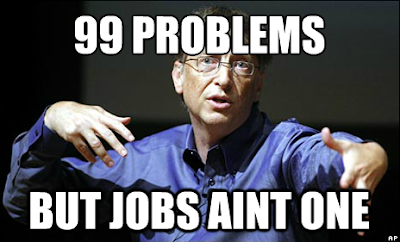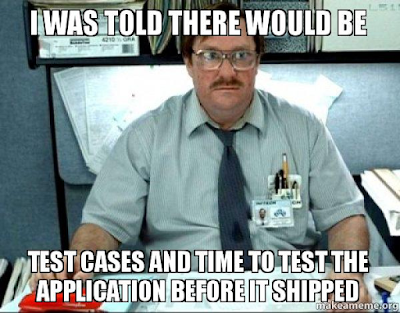Working for an Enterprise vs SaaS vs Freelancing
Various types of work attract different kinds of people, some of us like a dynamic work atmosphere, while others function best if things are more predictable and stable. Working for a big enterprise client is a lot different compared to dealing with clients directly while freelancing or working for a SaaS (Software as a service) in which case the company is it's own "client". I've worked in all three mentioned scenarios - currently, I'm working on a big enterprise project, in the past I've worked for several years for a company that was selling its own product and done some freelancing for a couple of years, as well.
Bellow I will strive to list the advantages and disadvantages of all three types of jobs, in hope that this may prove useful for people looking for their first IT job. With memes, as always. So let's get started!
Working for a SaaS Company
Working for a SaaS, Software as a Service company, you usually won't have any interaction with clients, as such companies are selling their own software as a product to customers, which means that internally the atmosphere in such companies is pretty relaxed, on average. The pros are that you will have an opportunity to get pretty close to people you work since there's no direct reporting to a client there usually are no overly strict deadlines and less pressure of that kind - there are always exceptions SaaS companies that just keep pushing for the development of new feature and putting more pressure on their employees than necessary. But in general SaaS work environment, on average is more casual compared to something like outsourcing. The down-side of all this might be that some SaaS companies might be a bit too relaxed, resulting in ignoring best practices (a lot of them don't even have unit tests!) no process in place or very loose adherence to a software development methodology. Also, if you're working in a smaller SaaS company (for example a very small start-up) you might be expected to do a lot more than in your job description, depending on a person this can be either a pro or a con, some will find it too stressful, others will thrive in the learning opportunity that's presented.
Working for an Enterprise
In more ways than one, working for a big enterprise has a lot of specifics. Things will usually move at a slower pace within a large corporate hierarchy, getting things approved may seems like an eternity, as everyone's manager will report to his manager, and another manager above, etc. There will be things like planned releases and lack of flexibility. While many big enterprises will claim that they are using cutting edge technologies, that will rarely be the case. You will see a whole lot of old technologies and witness the horrors of dealing with huge legacy codebases. Another thing, common for these large enterprises is they will claim to be Agile (to appear like they're up to date with the industry trends) while remaining true to Waterfall behind the scenes, after all old habits die hard. Example would be using the SAFe Agile framework - which is just Waterfall in disguise. On the plus side (some might see this as a disadvantage, though) since in enterprises time moves in slow-motion the amount of work required from you might be smaller than it would be in some small dynamic start-up company. Depending on your expertise the money could be quite good, but on the other side you might not have too much creative freedom and will be limited to using tried and true technologies - corporations don't like to experiment, if it works don't change it!
Working as a Freelance
This one might be the most challenging, for most people at least, due to many different factors. Starting up as a freelancer is tough, you will have to do low paying projects while you hone your skills, build your reputation and make new connections and try to gain some permanent clients. At first you will have to deal with stingy clients expecting a lot from you, but offering peanuts in the return. Another tough reality about freelance is that you will need to be (very often) a one way band, you will have to do all the things that normally a company that employs you does on your behalf: worry about paying taxes and other mandatory benefits, being the sales guy finding new clients for yourself, planning your work, negotiating and often doing things outside of the jobs description so you'll have to be quick while thinking on your feet and be a fast learner as well. The most successfully freelancers, from what I've observed, choose to specialize very narrowly, for example you might focus on just creating e-commerce sites with a specific WordPress plugging. When you know ins and outs of a certain tool you can accelerate delivery which is especially important for those clients who want things done "yesterday". In short, freelancing may bring you more money but you will also be working a lot more.
Thanks for reading, I hope you found the article useful.







This comment has been removed by a blog administrator.
ReplyDeletethanks for this post Bing Ads Coupon
ReplyDeleteThe preceding guide enables you to gain a thorough understanding of SaaS application development company. If you wish to pursue your own endeavor, you may easily do so. It's simply a matter of determining what you require in an app and who will develop it for you!! The remainder is left to professionals.
ReplyDeleteExcellent content. It will be beneficial to those who seek information. Continue to share your knowledge through articles like these, and keep posting on
ReplyDeleteData Engineering Solutions
Build scalable and efficient SaaS applications with Connect Infosoft Technologies, a leading SaaS application development company. Transform your business with our expertise and cutting-edge solutions.
ReplyDeleteWorking for an enterprise, SaaS, or as a freelancer each comes with its own unique set of challenges and rewards! Understanding these differences is key to making an informed career choice that aligns with your personal and professional goals. Freelancers can benefit from exploring the top freelance websites to find opportunities that suit their skills and preferences.
ReplyDelete